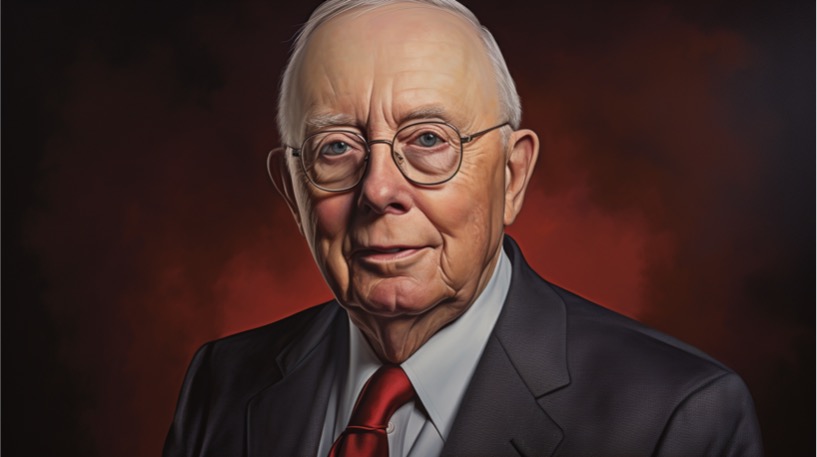Charlie Munger Age, Date Of Birth, Bio, Family And Net Worth
Charlie Munger, born on January 1, 1924, in Omaha, Nebraska, is a renowned American investor, businessman, and philanthropist, best known for his role as the vice-chairman of Berkshire Hathaway, a multinational conglomerate holding company headed by Warren Buffett. Munger’s partnership with Buffett has led to one of the most successful collaborations in the history of business, shaping both his own career and that of his business partner. Throughout his career, Munger has become a revered figure in the world of finance and investing, admired for his intellectual sharpness, disciplined approach to decision-making, and deep understanding of complex business dynamics.
- Age: 99 Years
- Date of Birth: January 1, 1924,
- Birth Place: Omaha, Nebraska
- Weight: 159 pounds (72 kilograms)
- Height: 5 feet 11 inches (1.80 meters)
- Net Worth: $2.6 billion

Munger was born to a family with a strong intellectual background. His father, Alfred C. Munger, was a lawyer, and his mother, Florence, was a homemaker. Charlie grew up in a household that valued education and intellectual pursuits, which significantly influenced his future endeavors. After completing high school, Munger enrolled at the University of Michigan, where he initially studied mathematics. He later served as a second lieutenant in the U.S. Army Air Corps during World War II. After the war, he returned to his studies, attending Harvard Law School, where he graduated with a law degree. Although he earned a law degree, Munger never practiced law but has often said that his legal education played a pivotal role in developing his critical thinking skills, which would later serve him well in his career as an investor and businessman.
Following his education, Munger began his professional career as a lawyer, working for a firm in Los Angeles. However, he soon realized that his true passion lay in business and investing. He transitioned into the world of real estate investment and became involved in various business ventures, both independently and in collaboration with others. Munger’s business acumen, combined with his sharp intellect and disciplined approach, allowed him to navigate the complexities of the real estate market and make successful investments. He was also heavily involved in other types of investments, helping him to develop a diversified portfolio.
Munger’s path to success in the business world took a decisive turn when he met Warren Buffett in 1959. The two quickly formed a mutual respect for one another, with Munger deeply impressed by Buffett’s investment philosophy. At the time, Buffett was already an accomplished investor, and Munger had his own successful ventures. However, the two men shared a similar worldview when it came to business and investing. Buffett’s focus on value investing, which emphasized buying undervalued stocks and holding them for the long term, was complemented by Munger’s intellectual approach to investing, which emphasized understanding the underlying business fundamentals and the management teams behind companies.
In the 1970s, Munger and Buffett formed a professional partnership at Berkshire Hathaway, with Munger becoming the vice-chairman of the company. While Buffett was the public face of Berkshire Hathaway, Munger played an equally critical role in shaping the company’s investment strategy and corporate culture. One of the key contributions Munger made to Berkshire Hathaway was introducing the concept of investing in companies with “moats,” or competitive advantages that would protect the businesses from competition. Munger’s perspective shifted Berkshire Hathaway’s investment strategy away from focusing purely on undervalued stocks to also considering the quality of the business, the strength of its competitive advantages, and the ability of its management team to drive long-term growth.
Munger’s influence also extended to the company’s management structure. While Buffett was known for his hands-on approach to managing investments, Munger was a strong advocate for decentralizing control within the company. He believed in giving the managers of Berkshire’s subsidiaries the autonomy to run their businesses without interference from the top, provided they adhered to the company’s overarching investment philosophy. This management philosophy has been a key factor in Berkshire Hathaway’s continued success and has allowed the company to grow into one of the most valuable and respected firms in the world.
Over the years, Munger’s investment philosophy has become an integral part of Berkshire Hathaway’s identity. Like Buffett, Munger is a firm believer in value investing, but he places particular emphasis on investing in high-quality businesses that possess durable competitive advantages. Munger has often spoken about the importance of focusing on the long-term prospects of a business rather than short-term market fluctuations. He is known for his ability to identify companies with strong management teams, solid business models, and long-term growth potential. His ability to recognize quality businesses, even when they are not immediately undervalued, has been a hallmark of his investing success.
One of the key aspects of Munger’s philosophy is the idea of a “multidisciplinary” approach to investing. Munger is an avid reader and has a broad range of intellectual interests that extend beyond the world of business and investing. He believes that investors should not limit themselves to just financial or economic knowledge but should also draw upon insights from other fields such as psychology, history, mathematics, and even the natural sciences. Munger refers to this approach as using “mental models,” which he believes helps investors to solve complex problems by applying principles from different disciplines. This broader perspective has allowed Munger to think creatively and make decisions that go beyond conventional investment strategies.
In addition to his intellectual approach to investing, Munger is known for his emphasis on risk management. He often stresses the importance of avoiding unnecessary risks and preserving capital. Munger has long maintained that the best way to make money in investing is by avoiding mistakes rather than constantly seeking out high-risk opportunities. This cautious approach to risk has been a critical factor in the long-term success of both Munger and Buffett, as they have been able to weather market downturns and economic crises without making significant errors that could jeopardize their investments.
Munger’s personal life has remained relatively private throughout his career, although he has been married twice. His first wife, Nancy Huggins, tragically passed away in 1957, and Munger later remarried to Molly, with whom he had a family. Munger’s family life has been a source of stability for him, and he has often spoken about the importance of maintaining a balanced perspective in both business and personal matters. Despite his significant wealth, Munger is known for his frugality and humble lifestyle. He has often emphasized that material wealth should not be the ultimate goal in life, and he has lived a relatively modest life compared to many other billionaires. This grounded perspective has earned him respect not only for his business acumen but also for his personal values and integrity.
As of 2025, Charlie Munger’s net worth is estimated to be around $2.3 billion. While this figure is substantial, it pales in comparison to the wealth of his business partner, Warren Buffett. Nevertheless, Munger’s fortune is a reflection of his success as an investor, his leadership at Berkshire Hathaway, and his ability to identify and capitalize on high-quality investments. Much of Munger’s wealth is tied to his holdings in Berkshire Hathaway, which has grown significantly over the years. Despite his wealth, Munger has remained relatively low-key, focusing on his work and intellectual pursuits rather than indulging in lavish lifestyles or excessive public attention.
Munger’s influence on the world of investing extends far beyond his financial achievements. He is widely regarded as one of the most thoughtful and articulate investors of his generation. His speeches, interviews, and writings have become a source of inspiration for many aspiring investors and businesspeople. Munger’s impact on Berkshire Hathaway, both in terms of investment strategy and corporate philosophy, has been profound, and his contributions will continue to shape the company for years to come.
In conclusion, Charlie Munger’s life and career offer a remarkable example of intellectual rigor, disciplined investing, and a commitment to long-term thinking. His collaboration with Warren Buffett has resulted in one of the most successful partnerships in business history, and his influence on the world of investing remains significant. Munger’s approach to investing, his focus on quality businesses, his emphasis on risk management, and his broad intellectual curiosity have made him a respected figure in the world of finance. As he continues to live a full and productive life at the age of 101, Charlie Munger’s legacy will undoubtedly continue to inspire future generations of investors, entrepreneurs, and business leaders.



